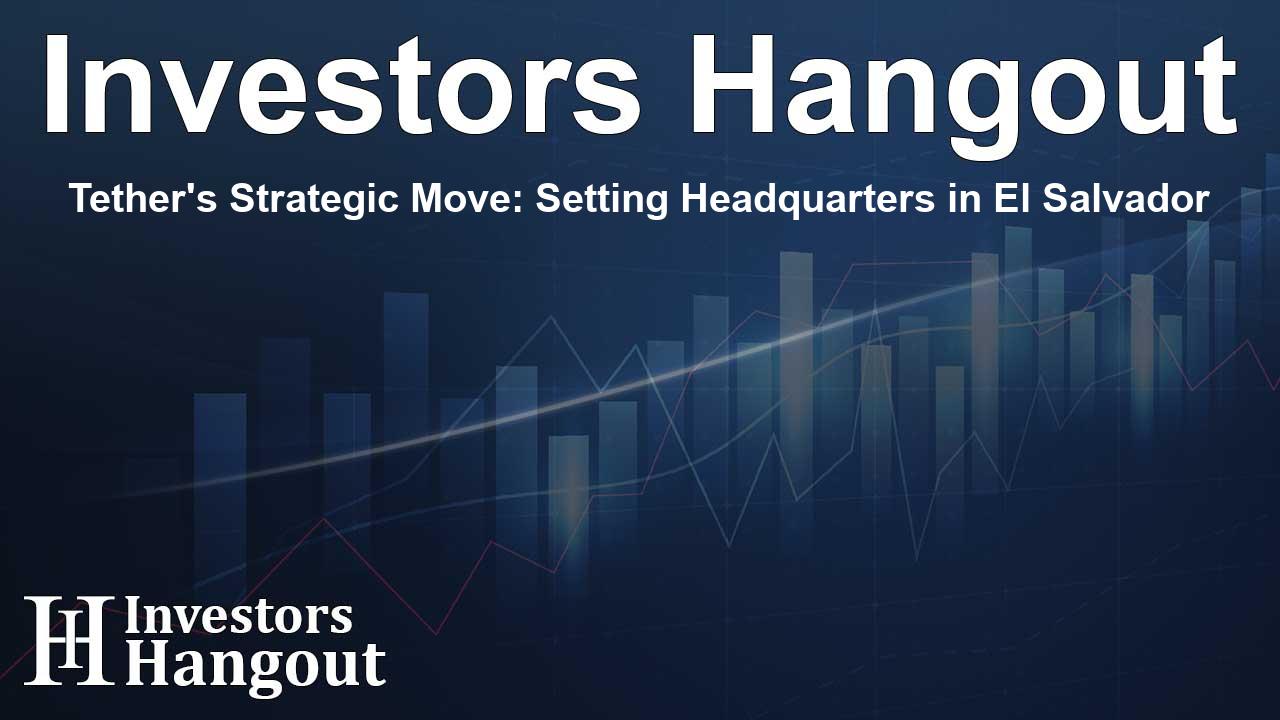Tether's Strategic Move: Setting Headquarters in El Salvador

Tether's Strategic Headquarters Relocation to El Salvador
Cryptocurrency firm Tether has announced plans to relocate its headquarters to El Salvador. This decision comes as the founders of the world’s leading stablecoin aim to capitalize on the Central American country's growing reputation as a hub for cryptocurrency trading. With a vision to anchor its operations, Tether is set to join a region that is increasingly welcoming to digital currencies.
The Rise of Stablecoins
Tether has emerged as a formidable player within the growing market for stablecoins. Unlike regular cryptocurrencies, these digital coins are designed to maintain a stable value by being pegged to traditional currencies. This structure allows users to transfer funds between various cryptocurrencies while mitigating the risks associated with high volatility.
Relocating for Growth and Stability
CEO Paolo Ardoino revealed that Tether’s decision to move follows the acquisition of a digital asset service provider license in El Salvador. This significant milestone will enable Tether to operate more effectively within a supportive regulatory environment. In addition, Ardoino and other senior management, including the co-founders, are set to relocate, although not all of the company's 100 employees will follow. The majority will continue remote operations, reflecting the evolving nature of work in the tech sector.
Regulatory Concerns and Market Dynamics
The fast-growing stablecoin market has sparked various regulatory concerns. Authorities are increasingly apprehensive that accumulating stablecoin reserves may pose significant risks to the broader financial system. Tether inherently serves as a connector between the cryptocurrency space and traditional financial markets, heightening scrutiny over its operational practices.
Transparency and Liquidity in Focus
Tether has faced scrutiny regarding its reserve holdings. While the firm maintains that most of its assets are backed by traditional currency reserves managed by Wall Street brokerage Cantor Fitzgerald, the details about these reserves remain somewhat opaque. The ongoing conversation around transparency is vital as Tether continues to operate in a climate of increased regulatory oversight.
Enhancing Security Against Illicit Activities
In response to growing concerns regarding illicit finance, Tether acknowledged that it is stepping up its monitoring measures concerning how its tokens are utilized. This proactive approach underscores the firm’s commitment to maintaining integrity within the cryptocurrency ecosystem.
Future Prospects in El Salvador
In exploring alternative locations for its headquarters, Ardoino acknowledged that Tether currently lacks operational licenses in the European Union and has temporarily excluded the United States from consideration. As El Salvador positions itself as a progressive landscape for digital currencies, Tether’s relocation is poised to contribute to the nation’s aspirations of becoming a leading trading hub.
The Impact of Political Change
The political landscape plays a significant role in cryptocurrency market dynamics. With the election of Donald Trump raising hopes for a more favorable regulatory environment, the implications for Tether and its operations remain to be seen. The firm is counting on an evolving regulatory climate that could foster growth and expansion opportunities in the future.
Conclusion: A New Chapter for Tether
Tether accounts for a substantial portion of the stablecoin market, with its USDT token representing roughly two-thirds of the total $212 billion market value, according to recent data. The overall growth of the stablecoin market has surged by around 45% over the past year, revealing a robust demand for crypto solutions that safeguard against volatility.
Frequently Asked Questions
Why is Tether moving its headquarters to El Salvador?
Tether aims to leverage El Salvador's emerging status as a crypto-friendly hub, which enhances operational efficiency and aligns with the country's supportive regulatory environment.
What are stablecoins and why are they important?
Stablecoins are digital currencies pegged to traditional assets, maintaining a consistent value to offer stability in the volatile cryptocurrency market, thereby providing users with a safer means of transaction.
What regulatory challenges does Tether face?
Tether has faced scrutiny regarding its reserve transparency and the potential systemic risks posed by stablecoins, prompting increased regulatory oversight within this evolving market.
How will Tether increase monitoring of its tokens?
Tether is implementing enhanced measures to monitor how its tokens are used, prioritizing security and the reduction of illicit activities within the cryptocurrency space.
What is the market share of Tether among stablecoins?
Tether's USDT token constitutes approximately two-thirds of the total $212 billion in stablecoins currently in circulation, indicating its significant influence in the market.
About The Author
Contact Dominic Sanders privately here. Or send an email with ATTN: Dominic Sanders as the subject to contact@investorshangout.com.
About Investors Hangout
Investors Hangout is a leading online stock forum for financial discussion and learning, offering a wide range of free tools and resources. It draws in traders of all levels, who exchange market knowledge, investigate trading tactics, and keep an eye on industry developments in real time. Featuring financial articles, stock message boards, quotes, charts, company profiles, and live news updates. Through cooperative learning and a wealth of informational resources, it helps users from novices creating their first portfolios to experts honing their techniques. Join Investors Hangout today: https://investorshangout.com/
The content of this article is based on factual, publicly available information and does not represent legal, financial, or investment advice. Investors Hangout does not offer financial advice, and the author is not a licensed financial advisor. Consult a qualified advisor before making any financial or investment decisions based on this article. This article should not be considered advice to purchase, sell, or hold any securities or other investments. If any of the material provided here is inaccurate, please contact us for corrections.
